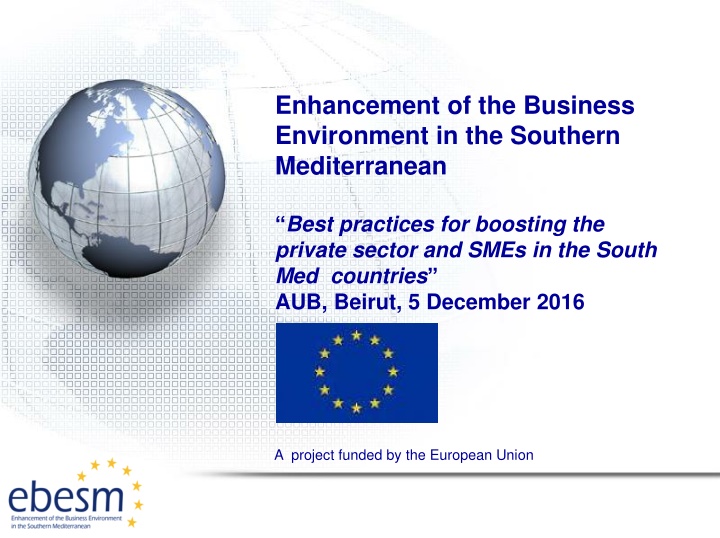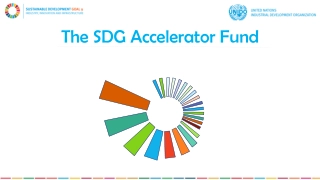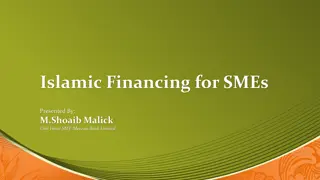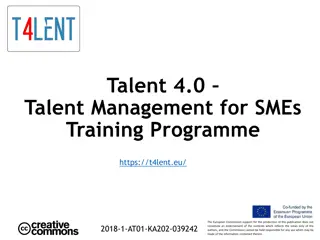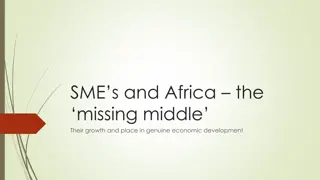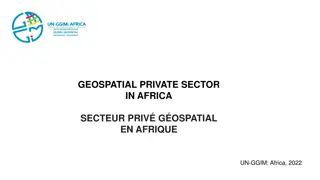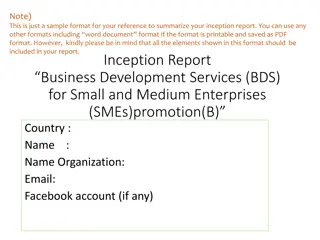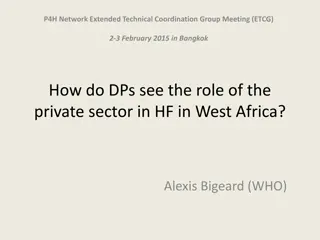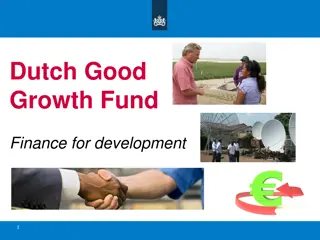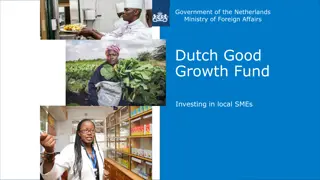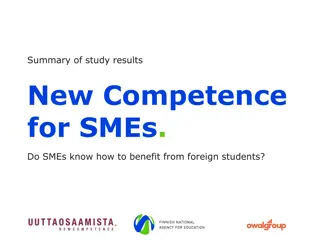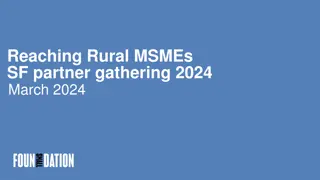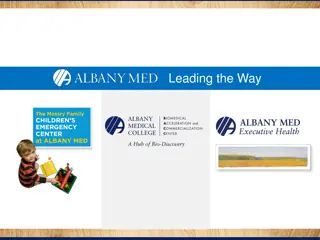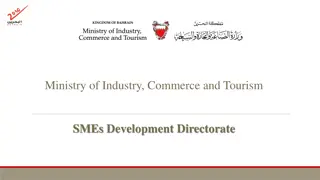Boosting Private Sector and SMEs in South Med Countries
This project, funded by the European Union, seeks to enhance the business environment in the Southern Mediterranean by implementing best practices to support the private sector and SMEs. The initiative focuses on interventions at macro, meso, and micro levels, targeting MSMEs and promoting entrepreneurship and industrial cooperation. The project aligns with the Small Business Act for Europe, promoting SME initiatives and governance while emphasizing the importance of SMEs in policy-making processes.
Download Presentation

Please find below an Image/Link to download the presentation.
The content on the website is provided AS IS for your information and personal use only. It may not be sold, licensed, or shared on other websites without obtaining consent from the author.If you encounter any issues during the download, it is possible that the publisher has removed the file from their server.
You are allowed to download the files provided on this website for personal or commercial use, subject to the condition that they are used lawfully. All files are the property of their respective owners.
The content on the website is provided AS IS for your information and personal use only. It may not be sold, licensed, or shared on other websites without obtaining consent from the author.
E N D
Presentation Transcript
Enhancement of the Business Environment in the Southern Mediterranean Best practices for boosting the private sector and SMEs in the South Med countries AUB, Beirut, 5 December 2016 A project funded by the European Union
1. Project Synopsis and Context EBESM, a 3-year Regional Project funded by the EU (3 m ) and implemented by GIZ Started in Jan. 2014 and runs until Nov. 2017. Part of the Private Sector Development Programme in the Southern Mediterranean (MED) (12 m ) targeting MSMEs by intervening at : Macro-level (MSME business enabling environment) - EBESM project - GIZ Meso-level (reinforcing MSME support agencies) - EUROMED invest project - ANIMA Micro-level (support for regional clusters) -Cultural and Creative Industries project - UNIDO Activities linked to the Euro-MED Industrial Cooperation Process to promoting SMEs, entrepreneurship and industrial cooperation: the 2014 -16 Work Programme adopted at Brussels 9th Ministerial meeting Follows the assessment of the implementation of SME policies carried out by the EC, OECD, ETF and EIB in 2014 based on the Small Business Act for Europe (SBA). EBESM Project 2
2. EBESM Background & Policy Framework (1) What is the Small Business Act ? The SBA is a comprehensive policy framework recognising the central role of SMEs. Adopted in June 2008 by the EU In 2011, MED Ministers decide to gradually align the Euro-MED Charter Enterprise (previously used as SMEs policy framework) with the SBA Main objective: create a common framework for SME initiatives and implement the Think Small First principle 10 principles and a set of policy actions to implement them Enhanced governance to give SMEs a greater role: through the network of SMEs envoys (EU) / SBA coordinators (MED) SMEs will have a say in policy making Process: SBA Review (assessment) and Public Consultation EBESM Project 3
2. EBESM Background & Policy Framework (2) 10 Principles of the Small Business Act 1. 2. 3. Entrepreneurial learning and women entrepreneurship Bankruptcy and second chance Regulatory Framework for SME policy making - Think Small First principle Operational Environment- Make public administrations responsive to SMEs needs SME Support Services and Public Procurement Access to Finance for SMEs Standards and technical regulations Enterprise skills and Innovation SMEs in a Green Economy 10. Internationalisation of SMEs 4. 5. 6. 7. 8. 9. EBESM Project 4
2. EBESM Background & Policy Framework (3) SBA Assessment Process in the MED countries The SBA Assessment is a joint process implemented by the European Commission, OECD, EIB and the European Training Foundation (ETF). Based on the SME policy Index Each MED country has nominated a SBA national coordinator who has a crucial role. First process based on the former Charter for small enterprises in 2008 Second assessment conducted in 2013 and published in 2014 Structured around the Small Business Act Follow-up : Support to implement policies on key topics identified in the recommendations EBESM Project 5
2. EBESM Background & Policy Framework (4) SMEs and the MED Region 90% of businesses in the MED region are MSMEs; they are the backbone of the economy Average number of SMEs per 1000 people in MED area is 23 but SMEs have an important development potential in the Region 82% are micro firms (1-9 employees) 33% of total employment Mostly active in trade, services and manufacturing Adoption of Euro-Mediterranean Charter for Enterprise (2004) and alignment with the Small Business Act (SBA) for Europe (since 2014) will help SME development in MED countries EBESM Project 6
2. EBESM Objectives Global Objectives: Enhance the business environment and promote SME and entrepreneurship development in the MED region, in line with EU best practices, namely the Small Business Act for Europe (SBA) Expand the private sector through the development of more robust, inclusive and sustainable growth. Activities aim at: (1) Supporting the work on Euro-MED Industrial Cooperation to implement reforms; (2) Building capacities of the SBA Coordinators in MED countries to advocate for MSMEs Development - reinforcing their role of catalyst for SMEs policies across all institutions/agencies; and (3) Raising awareness and facilitating MSME access to finance. EBESM Project 7
4. EBESM Work Programme Built around three(3) major themes : 1. Governance of the SBA in particular principles 3 and 4: Think Small First and Public administration responsive to SME needs . 2. Access to finance for MSMEs 3. Women Entrepreneurship 4. But also on specific needs as expressed by national stakeholders (i.e. selected SBA Principles) Approach: 3 gradual steps or levels of intervention: Level 1: learning - Level 2: learning-by-doing - Level 3: doing (with TA and support) - Achieved through policy dialogue, sharing experience and good practices EBESM Project 8
5.EBESM Beneficiaries All ENP South Countries* GIZ sharing country office with other German development cooperation organisations GIZ office * The EU cooperation with government and public institutions from Syria is temporarily suspended.
6. Activity: Selected SBA Principles In-country training activities conducted in all MED countries Covered some high priority and crucial SME economic drivers, for instance : Innovation (Algeria, Tunisia, Palestine), Information on businesses and SME observatory (Morocco), SMEs in Green economy (Morocco, Egypt), Improving enterprise skills (Algeria, Jordan), Internationalisation of SMEs (Lebanon) Supporting SMEs to benefits from the Euro- Mediterranean network and partnerships (Jordan). 1 0 EBESM Project 10
6. Activity: Selected SBA Principles 8 two-day training seminars One in each MED country followed the presentation of the evaluation results of SBA implementation, ensuring a high degree of media coverage and ministerial presence (Algeria, Morocco, Tunisia, Lebanon and Palestine) 550 participants trained From both the public and private sectors, and civil society at large, including academia and NGOs Constraints/bottlenecks as well as strengths/opportunities identified In SBA principle implementation: 12 SWOT Analyses carried out (one per country per topic) 12 actionable recommendations developed One per country per topic, in collaboration with all participants, that the country could immediately implement to improve implementation of selected SBA principles Substantial corpus of high-level training & documentation Developed by experts (e.g. concept notes, relevant data sources, recent studies and reports including a detailed bibliography) 1 1 EBESM Project 11
7. Activity: SBA Governance Approach: Learning by Doing Development of a small-scale action plan per country 3-stage approach : Planning/Enhancing/Implementing Great success Core objective: Improve governance of national SME policies and programmes, focusing on principles 3 and 4 of the Small Business Act for Europe: Think Small First ; and Public administration responsive to SME needs Focus on three governance issues: Delegation of responsibility for enterprise policy Inter-governmental coordination Public-private dialogue 1 2 EBESM Project 12
7. SBA Intervention Logic Improve the Governance of the SBA Think Small First-Public administration responsive to SME needs Implementing: Supporting MED countries to select a small scale action plan and assess its feasibility - 8 preparatory in-country workshops conducted Enhancing: Regional Seminar in Barcelona (17-19 March 2015) 8 MED country delegations / 32 participants - private and public sectors. Including young and women entrepreneurs - 12 EU experts provided recommendations to enhance Action Plans - Friendly criticism process Planning: Supporting MED countries to select a small scale action plan and assess its feasibility - 8 preparatory in-country workshops conducted (Jan-Feb 2015) EBESM Project 13
7. SBA Governance Results Lebanon: Public Private Dialogue (PPD) to boost industrial exports PPD architecture, mechanism, road map, action plan developed. PPD launched during a workshop with the presence of the Minister of Industry and EUD high level official (29 October 2015) Ministerial decision to institutionalise the process in the administrative circuit. Training provided in policy advocacy Egypt: PPD for SMEs Policy Making Pilot: Sustainable and Green Cities General architecture/mechanism developed Tested in the area of Sustainable Green Cities 3 cities targeted Workshop organised to develop an action plan and a road map in collaboration with stakeholders of the 3 cities targeted Benefit from further EU assistance to develop the whole process 1 4 EBESM Project 14
7. SBA Governance Results Morocco: SME Test - a New legal tool for national competitiveness, SME test tool developed and will be integrated in the RIA Ministerial decree to institutionalise the process Benchmark study of EU SME test systems and procedures developed Workshop in Rabat to present the Tool (17 Sep 2015) Jordan:SME Test for national competiveness Series of consultations meetings with high-level representatives from both the public and private sectors in Jordan, to assess the current approach to policy making and legislative or regulatory drafting in Jordan carried out Training and development of the SME Test Tool Fully-fledged tool developed in line with the own EC protocol Tunisia: Public Administration Responsive to SME Needs Development of an SME Platform to identify the administrative obstacles and challenges facing entrepreneurs in the country. 1 5 EBESM Project 15
8. Activity: Access to Finance Unlocking A2F for MSME (less than 20% of financing goes to MSME) Selecting small-scale action plan and implementation Identifying and implementing a small scale action plan for reforms Raising awareness and facilitating MSME access to financing National seminars to involve all stakeholders in the process- raising awareness about existing MSME public policies, mechanisms and instruments and sharing good practices Fine tuning actionable recommendations and defining work plans Policy-oriented/recommendations seminars at regional levels involving high level decision takers from both public and private sectors Identifying A2F Instruments - Policy recommendations Establishing a specialised WG on A2F Conducting national and consolidated policy studies Focus groups/Dialogue- Policy recommendations EBESM Project 16
8. A2F Results so far - 8 national studies and 1 consolidated, produced and published - 2 regional seminars conducted in Brussels - 6 In-country seminars conducted so far : Tunisia, Algeria, Jordan, Egypt and Lebanon - EBESM Technical assistance in preparation: Developing a policy and regulatory framework on crowdfunding for Tunisia and Algeria Developing a mezzanine fund for Egypt EBESM Project EBESM Project 17
9. Women Entrepreneurship Enhancing Policies to support Women Entrepreneurship Development in the MED region Establishing formal PPD Mechanisms (actions plans and road map) to help grassroots women and/or entrepreneurs associations become vocal in advocating specific public policies for supporting women s entrepreneurship in the MED region ) Raising awareness and building capacities in policy advocacy (Tamkin) Fine tuning actionable recommendations at national level Policy options and instruments to enhance the policy framework for women entrepreneurship development discussed at regional level Reports key findings and preliminary results to be further fine tuned through focus groups at sub-regional level Survey (face-to-face) to collect empirical evidence on the impact of existing policies on women entrepreneurship Report (national and consolidated) to issue evidence-based policy recommendations for local authorities + action plan Establishing a Working Group on Women Entrepreneurship EBESM Project 18
10. Good Practices in MED countries Government will: Without reform-minded and active leadership to implement reforms from top management, all projects efforts would have been futile. Where there is a vision and support for change, success can be achieved. If both do not exist together, sustainable change is difficult to obtain. Both vision and support appeared to be present in many MED countries where leadership and the quality and motivation of the SBA coordinators were critical to the success of EBESM activities. This should be a pre-condition for any PSD implementation programme. Choice of the right institution/national coordinator: SME policy-making is a complex issue, operating on many level and involving a wide range of ministries and agencies, often operating in silos. The choice of the right coordinator and team is fundamental to the success of the action plan implementation : intelligence, hard work, energy, goodwill are NOT enough, since a lot of the results are dependent on political decisions which require "weight" and many coordination efforts. Involvement of the private sector: bringing together a group of actors from the public and private sectors, including other members from the civil society (i.e. academics, media) notably through public-private dialogue- to identify policies and reforms for boosting private sector is crucial. Through equitable and open dialogue, governments avoid the risk of following most powerful voices, which rarely speak in the best interest of SMEs. 1 9 EBESM Project 19
Thank you for your attention Your questions so far? Contact: Marie-Jose Char Email : M.J.CHAR.GIZ@outlook.com Website: www.ebesm.eu Project implemented by:
